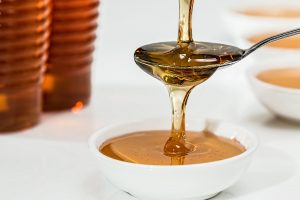 If it were just a matter of cutting out the added sugar in coffee or opting out of that candy bar after work, cutting down on added sugar wouldn't be a problem. However, today sugar is in everything. In fact, each year the average American consumes approximately 152 pounds of sugar in a year. That's three pounds or six cups a week. Great-great-great grandma and grandpa at only about two pounds of sugar 200 years ago. Can you avoid sugar entirely? Are there healthier alternatives to white sugar that you can use to avoid the health issues too much sugar causes?
If it were just a matter of cutting out the added sugar in coffee or opting out of that candy bar after work, cutting down on added sugar wouldn't be a problem. However, today sugar is in everything. In fact, each year the average American consumes approximately 152 pounds of sugar in a year. That's three pounds or six cups a week. Great-great-great grandma and grandpa at only about two pounds of sugar 200 years ago. Can you avoid sugar entirely? Are there healthier alternatives to white sugar that you can use to avoid the health issues too much sugar causes?
Sugar provides extra energy, but that means more calories.
The same is true of sugar substitutes, at least most sugar substitutes. Stevia is one of those exceptions. Stevia comes from the leaves of the Stevia rebaudiana bush in South America. It's 200 times sweeter than sugar, but has zero calories. Unlike sugar, stevia has certain properties that may help lower blood pressure and aid in preventing metabolic syndrome. Its ability to lower blood pressure is the reason you should take care if you already have low blood pressure. Some medications react negatively when you consume stevia.
Fresh fruit can be used in place of sugar.
If you bake, using natural applesauce to replace both the oil and the sugar in the recipe is an option. A paste made of dates is also another exceptionally good sweetener. You can sweeten most desserts naturally by adding fruit. For instance, if you buy yogurt and fruit in the grocery, it normally has added sugar. Make your own by chopping fresh or froze natural fruit into yogurt. While these options do add calories, they also come with nutritional benefits and are far more filling. Date paste is also a great option for diabetics, since it has a low GI rating.
Have you ever tasted monk fruit?
Like stevia, monk fruit has been valued for years for its sweetness. It's about 150 to 300 times sweeter than sugar. It doesn't affect blood glucose levels and has no calories. Monk fruit is also known as Luo Han Guo, longevity fruit and Buddha fruit. It was used by Buddhist Monks in early medicine for upper respiratory problems, and has been proven to reduce mast cells that produce the histamine that causes symptoms of allergies. It also boosts the immune system, since it's high in vitamin C. It also can promote heart health and reduce inflammation that can cause pain and serious conditions. Not everyone likes the taste, which is different than sugar and leaves a residual taste in the mouth. That's why some manufacturers add other ingredients that affect the nutrition of monk fruit. Some people shouldn't use it, like those who have pancreatic problems or allergies to pumpkins.
- A newer entrant in the sweetness market is the yacon plant. It has a flower like a daisy, but a root like a sweet potato. It can be eaten raw, tastes like a combination of apple, celery and watermelon and has the texture of water chestnuts. The root is boiled down to get a sugar substitute that lowers blood sugar.
- While 100 grams of honey is only slightly lower in calories than 100 grams of sugar, honey contains enzymes, iron, antioxidants, calcium, potassium, phosphorous, vitamin B6, riboflavin and niacin. A tablespoon of raw honey has a lower glycemic impact than a banana. Darker honey is more nutritious.
- Coconut sugar has a third fewer calories than table sugar. It is high in iron, zinc, polyphenols, potassium, antioxidants, calcium and other plant nutrients. It's a good sugar substitute for baking.
- Sugar alcohol, such as xylitol and erythritol have proven beneficial for diabetics and packed with antioxidants. Xylitol may prevent tooth decay, reduce the risk of infection, has a low GI, but also may cause diarrhea and gas.
For more information, contact us today at Habitat Health & Fitness

